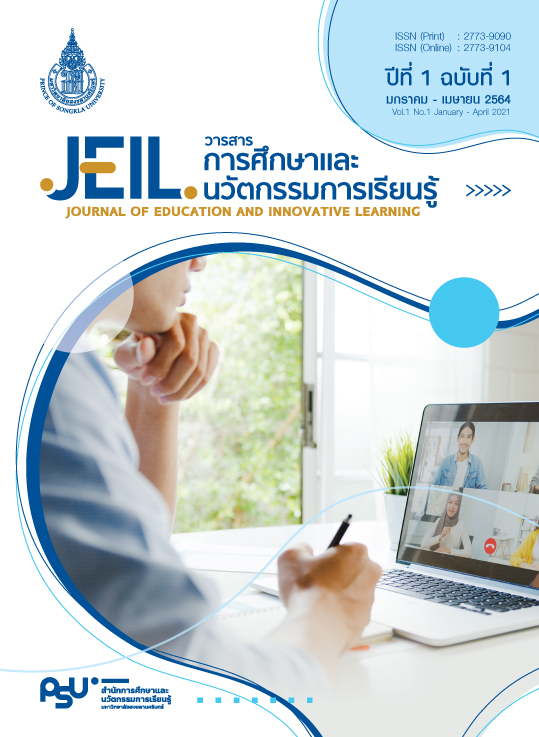บทบาทของการจัดการเรียนรู้แบบเชิงรุกในการพัฒนาสมรรถนะนักบัญชีมืออาชีพ
Main Article Content
บทคัดย่อ
การศึกษานี้มีวัตถุประสงค์เพื่อสำรวจแนวทางการจัดการเรียนการสอนแบบเชิงรุกของหลักสูตรบัญชีบัณฑิต และศึกษาระดับสมรรถนะนักบัญชีมืออาชีพยุคใหม่ของนักศึกษาหลักสูตรบัญชีบัณฑิต รวมถึงศึกษาบทบาทของการจัดการเรียนการสอนแบบเชิงรุกในการพัฒนาสมรรถนะการเป็นนักบัญชีมืออาชีพยุคใหม่แก่นักศึกษา โดยเก็บรวบรวมข้อมูลจากนักศึกษาหลักสูตรบัญชีบัณฑิต ชั้นปีที่ 3 และปีที่ 4 จำนวนทั้งสิ้น 365 คน จากสถาบันอุดมศึกษาในภาคใต้ จำนวน 11 มหาวิทยาลัย โดยใช้แบบสอบถามออนไลน์ วิเคราะห์ข้อมูลด้วยสถิติเชิงพรรณนาและทดสอบสมมติฐานโดยใช้วิธีการวิเคราะห์การถดถอยเชิงพหุ ผลการศึกษา พบว่า หลักสูตรบัญชีบัณฑิตของสถาบันต่าง ๆ ใช้แนวทางการจัดการเรียนการสอนแบบเชิงรุกในระดับมาก โดยมีการใช้วิธีการจัดการเรียนการสอนแบบการเรียนรู้ร่วมกันมากที่สุด รองลงมาคือการเรียนรู้โดยใช้กิจกรรมเป็นฐาน การเรียนรู้โดยใช้เทคโนโลยีเป็นฐาน การเรียนรู้โดยใช้ปัญหาเป็นฐาน การเรียนรู้โดยใช้โครงงานเป็นฐาน การเรียนรู้โดยใช้การทำงานเป็นฐาน และการเรียนรู้โดยใช้การวิจัยเป็นฐานตามลำดับ โดยผลการประเมินสมรรถนะนักบัญชีมืออาชีพยุคใหม่แสดงให้เห็นว่านักศึกษาหลักสูตรบัญชีบัณฑิตมีสมรรถนะนักบัญชีมืออาชีพยุคใหม่ในระดับมาก โดยเฉพาะอย่างยิ่งในด้านจรรยาบรรณวิชาชีพและหลักธรรมาภิบาล รองลงมาคือทักษะในการปรับตัว ทักษะการสื่อสาร ทักษะด้านเทคโนโลยีสารสนเทศ ทักษะการคิดสร้างสรรค์ ทักษะการคิดวิเคราะห์ ความรู้เชิงเทคนิคทางวิชาชีพ และมีระดับทักษะด้านภาษาอังกฤษน้อยที่สุด โดยผลการทดสอบสมมติฐานแสดงให้เห็นว่าวิธีการจัดการเรียนการสอนแบบเชิงรุกมีอิทธิพลเชิงบวกต่อระดับสมรรถนะของการเป็นนักบัญชีมืออาชีพยุคใหม่ทุกด้านอย่างมีนัยสำคัญ
Article Details

อนุญาตภายใต้เงื่อนไข Creative Commons Attribution-NonCommercial-NoDerivatives 4.0 International License.
เนื้อหาและข้อมูลในบทความที่ตีพิมพ์ในวารสารการศึกษาและนวัตกรรมการเรียนรู้ ถือเป็นข้อคิดเห็นและความรับผิดชอบของผู้เขียน ซึ่งกองบรรณาธิการวารสาร ไม่จำเป็นต้องเห็นด้วยหรือร่วมรับผิดชอบใด ๆ และไม่สงวนสิทธิ์การคัดลอกบทความเพื่อใช้ประโยชน์ทางวิชาการ แต่ให้อ้างอิงข้อมูลแสดงที่มาของบทความทุกครั้งที่นำไปใช้ประโยชน์
เอกสารอ้างอิง
Bell, S. (2010). Project-based learning for the 21st century: Skills for the future. The clearing house, 83(2), 39-43.
Brewer, P. C., Sorensen, J. E., & Stout, D. E. (2014). The future of accounting education: Addressing the competency crisis. Strategic Finance, 96(8), 29-37.
Chaplin, S. (2017). Accounting education and the prerequisite skills of accounting graduate: Are accounting firm’s moving the boundaries? Australian Accounting Review, 80(21), 60-70.
Christensen, J., Harrison, J. L., Hollindale, J., & Wood, K. (2018). Implementing team-based learning (TBL) in accounting courses. Accounting Education, 27(7), 1-25.
Daff, L., de Lange, P., & Jackling, B. (2012). A comparison of generic skills and emotional intelligence in accounting education. Issues in accounting education, 27(3), 627-645.
Dockter, D. L. (2012). Problem-based learning in accounting. American Journal of Business Education, 5(5), 547-554.
Edmond, T., & Tiggeman, T. (2009). Accounting experiences in collaborative learning. American Journal of Business Education, 2(7), 97-100.
El-Dalahmeh, S. M. (2017). Information technology (IT) competencies desired in new accounting graduates: A survey in Jordanian business environment. International Journal of Business and Management; 12(5), 202-208.
Hansen, J. D. (2006). Using problem-based learning in accounting. Journal of Education for Business, 81(4), 221-224.
Hiralaal, A. (2012). Students’ experiences of blended learning in Accounting Education at the Durban University of Technology. South African Journal of Higher Education, 26(2), 316-328.
Holtzblatt, M., & Tschakert, N. (2011). Expanding your accounting classroom with digital video technology. Journal of Accounting Education, 29, 100-121.
International Accounting Education Standards Board. (2015). Handbook of International Education Announcements. USA.
International Federation of Accountants, (2017). Handbook of International Education Pronouncements. New York, USA.
Irving, J. H. (2011). Integrating research into an undergraduate accounting course. Issues in Accounting Education, 26(2), 287-303. https://doi.org/10.2308/iace-10016
Jackson, D., & Meek, S. (2021). Embedding work-integrated learning into accounting education: the state of play and pathways to future implementation. Accounting Education, 30(1), 63-85.
Low, M., Botes, V., De La Rue, D., & Allen, J. (2016). Accounting employers’ expectations - the ideal accounting graduates. E-Journal of Business Education and Scholarship of Teaching, 10(1), 36-5.
Panich, V. (2012). Learning creativity for learner in 21st century. Bangkok: Tathata Publication Co.Ltd. [in Thai]
Park, Y., Piak, T., & Koo, J. (2019). Effect of student activity participation on accounting education. Journal of Open Innovation: Technology, Market, and Complexity, 5(40), 1-11.
Pruettikul, P. (2012). Quality of students derived from active learning process, Journal of Education Administratiom Burapha University, 6(2), 1-13. [in Thai]
Radianto, W. E. D. (2013). Using project-based learning (PBL) in management accounting course: lesson and reflection from entrepreneurship education. Journal of Modern Accounting and Auditing, 9(9), 1186-1193.
Rebele, J. E., & Pierre, E. K. (2019). A commentary on learning objectives for accounting education programs: The importance of soft skills and technical knowledge. Journal of Accounting Education, 48, 71-79.
Rufino, H. D., Payabyab, R. G., & Lim, G. T. (2018). Competency requirements for professional accountants: Basis for accounting curriculum enhancement. Review of Integrative Business and Academic Research, 3(7), 116-128.
Srinon, R., Srinon, U., Yomdit, V., & Kitnopkiat, K. (2018). Active Learning Management in the Era of Thailand 4.0. Journal of Educational Administration, Silpakorn University, 9(2), 331-343. [in Thai]
Stanley, T., & Xu, J. (2019). Work-Integrated learning in accountancy at Australian universities – forms, future role and challenges. Accounting Education, 28(1), 1-24.
Tempone, I., Kavanagh, M., Segal, N., Hancock, P., Howieson, B., & Kent, J. (2012). Desirable generic attributes for accounting graduates into the twenty-first century: The views of employer. Accounting Research Journal, 25(1), 41-55.
Thipakorn, B. (n.d.) Misconception in Thailand Qualification Framework for Higher Education. Retrieved from https://www.c4ed.kmutt.ac.th/experience/ [in Thai]
Tomlinson, M. (2008). The degree is not enough’: students’ perceptions of the role of higher education credentials for graduate work and employability. British Journal of Sociology of Education, 29(1), 49-61.
Wyness, L., & Dalton, F. (2018). The value of problem-based learning in learning for sustainability: Undergraduate accounting student perspectives. Journal of Accounting Education, 45(1), 1-19.


